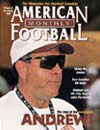Article CategoriesAFM Magazine
|
Hiring the EnemyWhen a coach is hired by a rival school, fans go nuts. But coaches say, in most cases, they\'d be nuts not to accept the job.by: Richard Scott © More from this issue THERE WAS A TIME WHEN CARL TORBUSH AND MIKE O'Cain were enemies. At least that's the way fans and media painted their relationship. Coaches at rival schools are supposed to hate each other, right? They're supposed to spread evil rumors about each other, undercut each other at every opportunity and wish the worst for each other, aren't they? And they would never, ever profess to respect each other or, heaven forbid, actually like each other. In truth, even though they coached at rival schools, Torbush at North Carolina and O'Cain at North Carolina State, they actually considered each other friends. That's the way it is in the coaching profession. Get past the fans and the perceptions behind the heated, hated rivalries in college football, and you might actually find coaches who respect each other enough to want to work ....The full article can only be seen by subscribers.
|
|
|||||||
| HOME |
MAGAZINE |
SUBSCRIBE | ONLINE COLUMNISTS | COACHING VIDEOS |
Copyright 2025, AmericanFootballMonthly.com
All Rights Reserved





